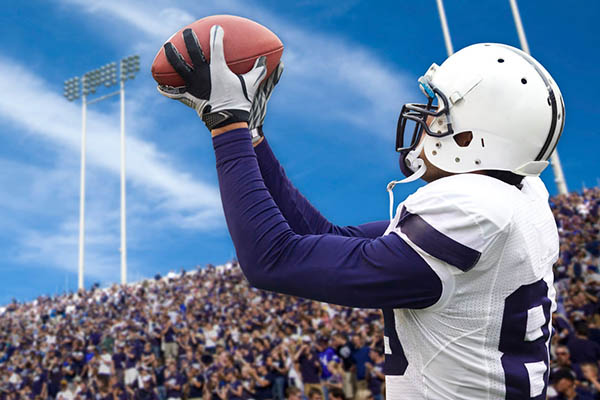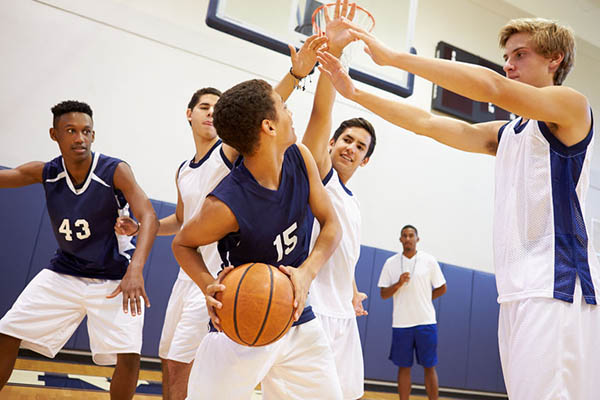


If you haven't yet practiced these principles you may not even know your true sports potential. That's perfectly fine. In fact, that's the point. The concept of discovering your potential is not a fixed concept. Potential in anything is always relative to where you are now. For this reason, you will have to adjust your goals as your abilities improve. Remember the saying that a journey of a thousand miles begins with a single step? That is how you find your potential. One step at a time.
A major theme in human psychology is based upon the concept that success is a by-product of doing what you love and humans struggle when we attempt to apply the principle in reverse; mistakenly believing that success will bring happiness. This fundamental theory is also applied to sports success. If you love your sport, you will easily find pleasure in every aspect of it from training to racing -- and this is what brings success.

Elite athletes have extremely rigorous training, dietary schedules and skill development routines. While you may not have the luxury of training full time, if you want to reach your potential, you'll need to set aside a specific amount of time to train each week. Sometimes finding time to train amid conflicting priorities such as work, family and social obligations can make it a challenge. For this reason, developing a structured training plan or routine can help.
Building strength is a simple way to improve your performance in nearly any sport. More strength equals greater power, speed, stability, and endurance, while reducing muscle fatigue and reducing the risk of injury.

Proper nutrition is often overlooked as a way to reach your peak sports potential. But consider how the right food and drink at the right time can be the difference between feeling strong through a race or bonking. Good nutrition alone may not win you medals, but poor nutrition is definitely going to lower your success potential.
Exercising on a full stomach is not the ideal. Food that remains in your stomach during an event may cause stomach upset, nausea, and cramping. To make sure you have enough energy, yet reduce stomach discomfort, you should allow a meal to fully digest before the start of the event. This generally takes 1 to 4 hours, depending upon what and how much you've eaten. Everyone is a bit different, and you should experiment prior to workouts to determine what works best for you. If you have an early morning race or workout, it's best to get up early enough to eat your pre-exercise meal. If not, you should try to eat or drink something easily digestible about 20-30 minutes before the event. The closer you are to the time of your event the less you should eat. You can have a liquid meal closer to your event than a solid meal because your stomach digests liquids faster.
Because glucose is the preferred energy source for most exercise, a pre-exercise meal should include foods that are high in carbohydrates and easy to digest. This include foods such as pasta, fruits, breads, energy bars and drinks.
Planning is essential if you are competing in an all-day event, such as track meets or other tournaments. Consider the time of your event, the amount of your meal and the energy required. Also, be aware of the amount of fluid you consume. You should plan ahead and prepare meals and snacks that you have tried before and know will sit well with you. Do not experiment with something new on the event day.
Eating before exercise is something only the athlete can determine based upon experience, but some general guidelines include eating a solid meal 4 hours before exercise, a snack or a high carbohydrate energy drink 2-3 hours before exercise, and fluid replacement (sports drink) 1 hour before exercise.
1 hour or less before competition have fruit or vegetable juice such as orange, tomato, or V-8, and/or fresh fruit such as apples, watermelon, peaches, grapes, or oranges and/or Energy gels and up to 1 and a half cups of a sports drink.
2 to 3 hours before competition have fresh fruit, fruit or vegetable juices, bread, bagels or low-fat yogurt sports drink
3 to 4 hours before competition have fresh fruit, fruit or vegetable juices, bread, bagels, pasta with tomato sauce, baked potatoes, energy bar, cereal with low-fat milk, low-fat yogurt, toast/bread with limited peanut butter, lean meat, or low-fat cheese or 30 oz of a sports drink
If you are an endurance athlete, recent evidence suggests that eating some sugar (like energy bars, some types of candy bars, or sports drinks) 35 to 40 minutes before an event may provide energy (glucose) to your exercising muscles when your other energy stores have dropped to low levels. However, you should experiment with such strategies before competition because some people do not perform well after a blood glucose spike.
Caffeine acts as a stimulant on the central nervous system. It had been thought to boost endurance by stimulating a greater use of fat for energy, and thereby reserving glycogen in the muscles. Recent research, however, doesn't support that theory. When caffeine improves endurance, it does so by acting as a stimulant. Caffeine can have serious side effects for some people. Those who are very sensitive to its' effects may experience nausea, muscle tremors, and headaches. Too much caffeine is a diuretic, and can result in dehydration, which decreases performance. If you compete at an International level, keep in mind that The International Olympic Committee has banned caffeine in certain quantities during international events.
Any foods with a lot of fat can be very difficult and slow to digest and remain in the stomach a long time. They also will pull blood into the stomach to aid in digestion, which can cause cramping and discomfort. Meats, doughnuts, fries, potato chips, and candy bars should be avoidied in a pre-exercise meal. Keep in mind that every one is a bit different and what works for you may not work for you teammate or training partner. Factor in individual preferences and favorite foods, and an eating plan is a highly individualize thing.

The first nutritional priority after exercise is to replace any fluid lost during exercise. In general the best way to determine how much to drink (either water or a sports drink) is to: Weigh yourself before and after exercise and replace fluid losses and drink 20-24 fl oz water for every 1 lb lost.
It is also important to consume carbohydrate (such as fruit or juice) within 15 minutes post-exercise to help restore glycogen. Research has shown that eating 100-200 grams of carbohydrate within two hours of endurance exercise is essential to building adequate glycogen stores for continued training. Waiting longer than two hours to eat results in 50 percent less glycogen stored in the muscle. The reason for this is that carbohydrate consumption stimulates insulin production, which aids the production of muscle glycogen. However, the effect of carbohydrate on glycogen storage reaches a plateau.
Research shows that combining protein with carbohydrate in the two hours after exercise nearly doubles the insulin response, which results in more stored glycogen. The optimal carbohydrate to protein ratio for this effect is 4:1 (four grams of carbohydrate for every one gram of protein). Eating more protein than that, however, has a negative impact because it slows rehydration and glycogen replenishment. One study found that athletes who refueled with carbohydrate and protein had 100 percent greater muscle glycogen stores than those who only ate carbohydrate. Insulin was also highest in those who consumed a carbohydrate and protein drink.
Consuming protein has other important uses after exercise. Protein provides the amino acids necessary to rebuild muscle tissue that is damaged during intense, prolonged exercise. It can also increase the absorption of water from the intestines and improve muscle hydration. The amino acids in protein can also stimulate the immune system, making you more resistant to colds and other infections.
If you are looking for the best way to refuel your body after long, strenuous endurance exercise, a 4:1 combo of carbohydrate and protein seems to be your best choice. While solid foods can work just as well as a sports drink, a drink may be easier to digest make it easier to get the right ratio and meet the 2-hour window.
Yes, it's true, your genetics are important when it comes to determining overall sports ability, but they are not the only thing. What you do with your genetic gifts are entirely up to you.
Adequate rest is a largely ignored component of most athlete's training programs. But more evidence is supporting the idea that it's the quality, not the quantity of your training that will have the largest impact on your performance. In fact, there are so many problems related to overtraining, that it actually has becomes a condition. It's called overtraining syndrome and it's an athlete's enemy because it saps not only your energy for your sports, but it robs you of your passion and enthusiasm for your sport as well. Remember that adding appropriate rest and recovery days into your training is critical for success.

Not everyone needs, wants or can afford a coach or trainer, but if you really want to find your potential it's not a bad idea. Think about it. Every elite and professional athlete has a coach or trainer. Why? Because a qualified professional makes it his or her job to help you find your strengths and weaknesses. They provide objectivity and sees things you don't. They fill that gap in your training knowledge and offer variety, expertise and motivation when you can't find it. They also figure out the details and let you focus on doing your best. Who doesn't want that?
Whether it is an aerodynamic bike wheel, blister-resisting socks a heart rate monitor or shaped skis, taking advantage of the technology that is available in your sport can often help save seconds or improve your accuracy. Not every product delivers what it promises, though, so do your research and talk to experts before you drop you dollars on products that are mostly hype.
The more your train the more efficient you will become. If your sport requires specific skills, such as a serve in tennis or cornering at high speed while cycling, you need to spend time honing these skills so they become natural and automatic. Nothing will lower your performance faster than analyzing your actions while you are competing. Take time to train sports skills exclusively and perform repeat drills once a week. This is another area where working with a coach or trainer is essential.
Sports psychology isn't just for elite athletes. While they may be more likely to work with a sports psychologist, the benefits of visualization training, relaxation training, and mental rehearsal can be used by anyone to increase confidence and replace jitters and anxiety and help you avoid psyching yourself out during training and competition.